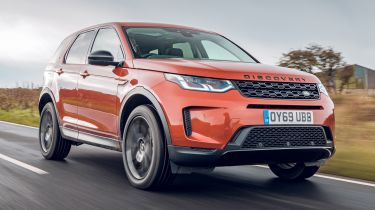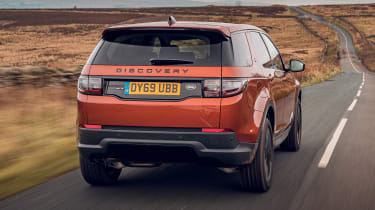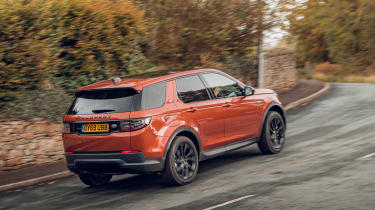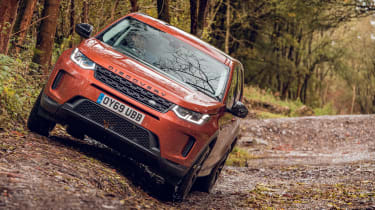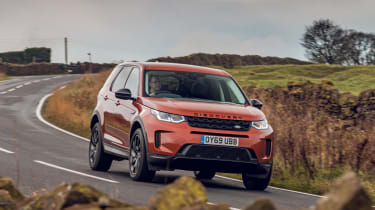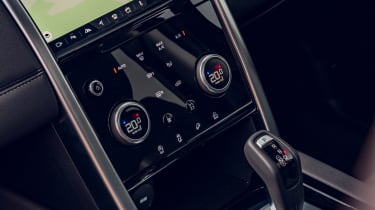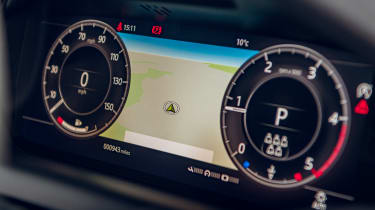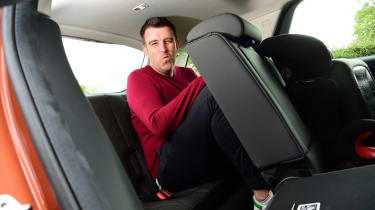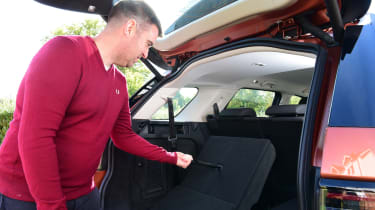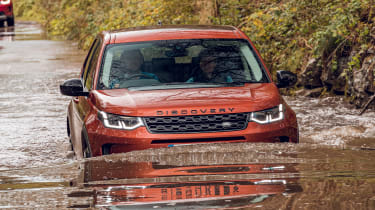Land Rover Discovery Sport review
The Land Rover Discovery Sport combines seven-seat practicality, go-anywhere performance and premium style

Land Rover used to be a rough and ready brand, but cars like the Land Rover Discovery Sport for sale today are a far cry from their rugged ancestors. In fact, think of the Discovery Sport as a more practical alternative to the luxury Range Rover Evoque and you won't be disappointed.
However, in spite of its luxury feel, the Land Rover Discovery Sport still betters its rivals for off-road ability. Cars with four-wheel drive feature Terrain Response, which adjusts the gears and traction control to suit different off-road conditions, and the Disco Sport is certainly capable of taking you where SUV/crossover rivals fear to tread.
With its premium badge and practical appeal, it’s just as effective on the school run, too.
About the Land Rover Discovery Sport
The Discovery Sport replaced the Freelander in the Land Rover range in 2014. Initially, it came with the Freelander's engines, but a switch to JLR's latest Ingenium petrol and diesel units soon after launch gave the Discovery Sport a boost. 2019 brought a significant update to the range, with exhaustive changes under the skin, including a platform strengthened and adapted to accommodate electrified drivetrains – both mild-hybrids (MHEV) and a plug-in hybrid (PHEV) variant. Land Rover again updated the model for 2021, this time primarily to improve infotainment and connectivity by adding its latest Pivi and Pivi Pro infotainment system.
Exterior styling inside and out has remained familiar, but subtle nips and tucks have kept the mid-size SUV looking fresh nearly ten years on from launch. This applies inside as much as out, with 2019’s update and the more recent changes allowing the Discovery Sport to keep pace with more recent arrivals in the class, particularly with regards to the speed and functionality of the car’s touchscreen displays.
A seven-seat option has been available the entire time, giving Land Rover something unique in the premium SUV class. It's priced at a level that puts it up against the likes of the Audi Q5, BMW X3 and Mercedes GLC, while the Jaguar F-Pace, Volvo XC60 and Alfa Romeo Stelvio are also opponents, although none of these cars offer seven seats. If that's a requirement, then you should have a look at the Skoda Kodiaq, Kia Sorento, VW Tiguan Allspace and SEAT Tarraco, while the Honda CR-V and Nissan X-Trail are also offered with seven seats as an option. These cars are also cheaper to buy, too.
Used - available now

2023 Land Rover
Discovery Sport
31,440 milesAutomaticPetrol1.5L
Cash £26,595
2021 Land Rover
Discovery Sport
30,950 milesAutomaticPetrol2.0L
Cash £22,995
2023 Land Rover
Discovery Sport
30,170 milesAutomaticPetrol1.5L
Cash £26,787
2021 Land Rover
Discovery Sport
60,828 milesManualDiesel2.0L
Cash £18,850Prices for the Land Rover Discovery Sport start from around £34,500. For that, you get a model with front-wheel drive, a manual gearbox and D165 diesel engine; adding four-wheel drive, an automatic gearbox and a mild-hybrid drivetrain will cause the price to climb to around £38,500.
One step above the basic Discovery Sport trim is the sporty R-Dynamic, available in both SE and HSE trim, the former starting at around £46,500. There’s also an Urban Edition trim, with a moodier look and equipment levels pitched between the basic Sport and the R-Dynamic models, which starts at £42,600. All three specifications are available with the mild-hybrid diesel D200 and plug-in hybrid P300e powertrains, while the P250 petrol MHEV is only offered in the R-Dynamic SE and HSE trims.
Engines, performance and drive
The update to the Discovery Sport range in 2019 brought a strengthened chassis, making it 10% more rigid than the previous model. This, plus revised engine and subframe mounting points for the engine and suspension subframe, means that it’s more refined than ever before. It’s really noticeable out on the road, where tyre roar and suspension noise are better suppressed than in many rivals.
The Land Rover’s relaxing character is enhanced by a composed ride. There’s a firm edge to the suspension at low speed that means it's less cossetting than a Mercedes GLC (at least one on air suspension), but the multi-link rear axle comes into its own the faster you go. Most bumps and potholes are effortlessly smoothed out.
The Discovery Sport isn’t the sharpest SUV to drive, but it handles as well as it’ll need to for most buyers. Body movement is well controlled, and there’s plenty of grip even on the standard fit all-weather tyres; the electronically controlled permanent four-wheel drive system delivers confidence-inspiring traction, even in the slipperiest conditions. The steering feels fairly slow compared to a GLC or a BMW X3, but it’s precise enough. Combined with the high-set driving position and excellent visibility, it allows you to place the Disco Sport on the road with confidence.
At times the Discovery Sport does feel quite large though, and while the view ahead is great, the standard rear camera and parking sensors are essential when reversing – that stylish rear screen looks letterbox narrow from the driver’s seat. It’s improved with the fantastic ClearSight high-definition rear-view screen: a switch on the rear view mirror allows for live images – relayed from a camera mounted on the roof – to be displayed. It’s great in bad weather or if the rear seats are full of passengers, while the wide angle lens all but eliminates blind spots.
Where the Land Rover steals a march over rivals such as the Jaguar F-Pace and BMW X3 is off the beaten track. It has better ground clearance, while the front and rear overhangs are shorter and higher, so steep slopes are easily negotiated. Its Terrain Response system can adapt the four-wheel drive’s traction control to suit different conditions, helping the car go further than most owners would dare to take it. Just choose between Normal, Mud, Sand, Rocks and Snow modes, then let the car’s sophisticated traction control system do the rest.
But that’s not all – you also get a variable hill descent control, an impressive wading depth of 600mm, plenty of ground clearance and excellent approach and departure angles. When the going gets tough, the Discovery Sport leaves its compact SUV rivals floundering.
0-62mph acceleration and top speed
In some applications, Land Rover’s range of Ingenium four-cylinder petrol and diesel engines can sound a little harsh, but they’re so well isolated in the Discovery Sport that they're quieter than the equivalent units in the Mercedes GLC.
Outside of the entry-level D165, a 2.0-litre diesel sending its power to the front wheels alone, all Discovery Sports now offer some level of hybridisation. This is split between the MHEV mild-hybrids and the PHEV plug-in hybrids, the latter only found right at the top of the range with the P300e drivetrain.
The mild-hybrids really are mild though – there’s no electric running here, instead using a small electric motor to recover some energy under deceleration and braking, then using it to take load off the engine under acceleration in order to save a small amount of fuel. Nevertheless, all all-wheel drive Discovery Sport models, including the D165 and D200 diesels, and the P250 petrol, are given the MHEV designation.
Petrol and diesel units both have 2.0-litre capacities. The petrol P250 develops 247bhp, while D165 and D200 diesel options offer 163 and 201bhp. Even the front-wheel drive D165 just sneaks under ten seconds for the 0-60mph dash (or 10.4 seconds to cover 0-62mph), and the same goes for the D165 MHEV. The D200 cuts the 0-62mph time to 8.6 seconds, and the P250 is quicker still, taking 7.8 seconds to sprint to 62mph. All are a couple of tenths slower in seven-seat form.
Land Rover also offers the P300e plug-in hybrid in the Discovery Sport range. With an all-electric range of up to 38 miles, the P300e is powered by a 1.5-litre three-cylinder petrol engine, combined with an electric motor to deliver a total power output of 305bhp and a useful 540Nm of torque. It’s quickest of all Discovery Sport models too, reaching 62mph from rest in 6.6 seconds.
A six-speed manual gearbox is available on the entry-level diesel; the only car in the range to send drive to the front wheels alone. While the six-speed manual gearbox is pleasantly smooth to operate – if a little long of throw – it doesn’t really fit the character of what is a very refined, laid back family car.
Every other model features four-wheel drive and a nine-speed automatic transmission. Though the gearbox is not quite as responsive as some rival systems, it’s very smooth and makes the most of the available performance by keeping engine revs in the mid-range where the engines are most subdued.
MPG, CO2 and running costs
When the Discovery Sport first came out, it represented a big step upmarket over the Freelander it replaced. It took a further move in a premium direction in the 2019 round of updates, and that’s reflected in the price. Prices start from just over £34,500, while the range-topping P300e R-Dynamic HSE is nearly £55,000. On the plus side, you do get plenty of kit for your money.
In 2019, Land Rover introduced mild-hybrid set-ups to the range, with all but the manual D165 now benefitting from the tech. The 48-volt system recovers energy that would otherwise be wasted when decelerating, stores it in a compact lithium-ion battery below the front seats, and deploys up to 140Nm of torque under acceleration to reduce the load on the combustion engine. It works alongside a stop/start system that’s able to switch off the engine below 11mph – allowing a few extra metres of fuel-free coasting. Land Rover reckons that the system boosts fuel efficiency by seven per cent.
Despite this, the engines are still towards the thirstier side of the class. Based on the latest WLTP test structure, the D165 manual with front-wheel drive achieves up to 45.1mpg – depending on wheel size – and emits from 164g/km. Add the MHEV tech, auto transmission and all-wheel drive and the numbers change to 42.9mpg and 173g/km The D200 achieves a maximum 42.0mpg and emits 176g/km.
The petrols will be quite steep to run, given their fuel usage. In official tests, the P250 petrol manages best economy of just 30.7mpg and emits 208g/km of CO2, despite that mild-hybrid technology.
Of course, the plug-in hybrid P300e is by far the most efficient model in the Discovery Sport range. According to Land Rover, the range topping model is able to return a claimed 180.6mpg and CO2 emissions are reduced to 35g/km. This latter figure makes it a big winner for business users paying Benefit-in-Kind tax.
Electric range, battery and charging
The Discovery Sport P300e can cover up to 37 miles on electric power alone, but you’ll need to charge the Discovery Sport PHEV to achieve close to that figure and maximise your fuel economy. Fully recharging the 15kWh battery in the plug-in model will take just over two hours from a home wallbox or nearly seven hours if you use a standard three-pin plug, which we don’t recommend relying on.
Unlike a lot of other plug-in hybrids, the Discovery Sport PHEV features DC rapid charging capabilities, so you can recharge the battery from flat to 80 per cent in just half an hour if you use a public rapid charger.
Insurance groups
Insurance groups are between 39 and 41 depending on engine and trim, which puts the Discovery Sport on a par with its main rivals. Good parts availability and top-notch safety features including sophisticated engine immobilising technology keep insurance costs down.
Depreciation
It’s good news for private buyers; our experts have calculated the Land Rover will hold on to between 62 and 66 per cent of its original value after three years and 36,000 miles.
To get an accurate valuation on a specific model check out our free car valuation tool...
Interior, design and technology
You only have to glance at the Discovery Sport to confirm it’s a Land Rover product but while the changes to the 2019 model were extensive under the skin, it’ll take a very keen eye to spot the changes from the outside.
As before, there’s the distinctive clamshell bonnet, the option of a contrasting roof, plus clean, simple body surfacing. Look closely, though, and you’ll notice new head and tail lights, plus a neater look for the bumpers both front and rear. There are a couple of new wheel designs ranging from 17- to 21-inches in diameter.
As per the Range Rover Evoque, you can personalise the Discovery Sport further. In addition to the contrasting roof there’s the option of the Black Exterior Pack which adds a black finish to the grille, door mirrors, and exterior trim. Pick a bold colour such as Namib Orange metallic and the Land Rover really stands out.
Inside, the Discovery Sport is pure Land Rover. The mid-life facelift brought wide-ranging improvements to the cabin, although the overall square, sturdy-looking layout remained. Apple CarPlay and Android Auto have been standard since 2019, and top trim levels have a gorgeous, customisable 12.3-inch driver’s display in place of odd-looking half-analogue/half-digital dials.
Many recent JLR products use a third display, which controls secondary functions like heating and ventilation. The Discovery Sport does without, instead using a pair of physical knobs. The multifunction items adjust the heating in their normal position setting, but push the dials in and they adjust the seat heaters and pull them out and they can tweak the fan speed (passenger side) or change the driving modes (driver’s side). As before, they all feel robust and look great.
Overall build quality feels solid, but the sliding middle row of seats fitted to the long-term test car we ran tended to squeak and rattle. One minor niggle is with the driver’s footwell, which is awkwardly shaped, so you might struggle to find a comfortable position for your left foot.
Equipment levels are strong regardless of trim. The entry-level, front-wheel drive Discovery Sport comes with 18-inch alloy wheels, 8-way heated manual front seats and the new Pivi Pro infotainment setup. R-Dynamic SE models build on this with 20-inch wheels, electric heated memory seats (12-way adjustable for the driver, 10-way for the passenger), a Meridian sound system and keyless entry, and HSE gives you even more seat adjustment, and Windsor leather seats among other niceties.
Sat-nav, stereo and infotainment
As part of a range of 2019 model year updates, Land Rover overhauled the Discovery Sport's infotainment system. All models get a 10.25-inch touchscreen system, which looks sharper and is far snappier than on previous models. The basic menu layouts are the same, which means that some of the icons are a little more fiddly to use than in several German rivals. If you prefer to make the most of your smartphone’s processing power then Apple CarPlay and Android Auto are also standard.
There’s also a new digital driver’s display, and it’s one we can highly recommend. The 12.3-inch screen lets users switch between driving, navigation and entertainment functions - or a combination of them simultaneously. It looks fantastic and feels fairly intuitive.
In 2021, Land Rover gave the car’s infotainment another boost with what it calls its Pivi and Pivi Pro systems. You no longer need to wait for the system to boot up when you start the car, and it features over-the-air updates too. Pivi Pro brings with it Amazon Alexa integration, and Spotify is now standard too, while there’s even an option in the menus to purify the cabin air, which should be reassuring if you spend a lot of time in traffic.
There’s also the option of another display: a flick of a switch on the smart rear view mirror turns from a regular reflective panel into a screen which relays images from a roof-mounted camera. It takes some getting used to – those used to a conventional mirror will naturally focus into the distance to see behind rather than the screen’s close-up images - but otherwise, it works brilliantly.
Then there’s Land Rover’s Clear Sight Ground View tech. This uses three forward-facing cameras to not only view the road ahead, but create a real-time image of the road directly ahead of and below the car, plus its relative position to the wheels. It’s perfect for not only off-roading around difficult obstacles, but also parking close to high kerbs.
The features don’t end there. Wireless charging, a 4G WiFi hotspot and a variety of USB and 12-volt connections are dotted around the cabin. Music fans will appreciate the glorious 11-speaker Meridian sound system that’s available on HSE models; the rest of the range uses a simpler six-speaker setup.
Practicality, comfort and boot space
While the 2019 updates to the Discovery Sport introduced new tech and hybrid systems, little of it altered the car’s practicality. That means there’s still a 5+2 seating layout, which makes the Discovery Sport rare in the compact premium SUV class. The rear two seats themselves are a little cramped for adults, but fine for kids.
The two individual rearmost chairs can be pulled out of the floor of the boot in one movement, while a sliding middle row allows for easy access and increased legroom. In the boot there’s a number of handy hooks and a 12V power supply, plus the option of an adjustable loading rail system.
Elsewhere in the cabin there’s plenty of useful storage, numerous cup holders and the availability of up to seven USB sockets – so everyone can charge their smartphones at once.
The use of an electric handbrake frees up space on the transmission tunnel for a pair of lidded storage boxes, while there’s a neat trinket tray set into the dashboard ahead of the front seat passenger.
Add all that to the fundamentals of good passenger head- and legroom (for the first five of seats, at least) and it doesn’t take long to realise a lot of thought has gone into the Land Rover’s family-friendly layout. Cubby spaces, though not lacking previously, are now more spacious following on from the 2019 updates.
Size
The Discovery Sport looks a little rear-heavy in profile, but, in fact, this seven-seat SUV, at 4,597mm long, is shorter than the five-seat Lexus NX. It’s shorter than the Audi Q5, too – testament to how clever its packaging is.
It is relatively tall at 1,727mm, although that doesn’t really make it feel any bulkier from behind the wheel – in SUV terms, the Discovery Sport seems relatively compact, especially given its carrying capacity. At more than two metres wide, even with the mirrors folded some parking spaces and garages may still be a squeeze.
Leg room, head room and passenger space
The additional height compared to rivals endows the Discovery Sport with a feeling of space for all occupants – especially HSE models equipped with the panoramic glass roof.
The middle row comprises three proper seats, and although the middle chair is a little thinner, the middle passenger won’t feel hemmed in. All three get plenty of knee- and foot space because the floor is flat, thanks to clever packaging of the transmission tunnel, and because the row can slide by up to 16cm backwards and forwards. The relatively flat chairs are soft and comfortable.
Access to the rearmost seats is easy because the back doors open almost to 90 degrees and the middle row tilts forward in one easy motion to reveal a wide access. Clearly, room is limited in these two chairs, but they’re fine for short distances.
Boot
With the rearmost seats stowed the Discovery Sport boasts a massive 963-litre luggage capacity – although this figure is measured to the roofline rather than under the load cover. Under the cover there’s a similar amount of space as in the Jaguar F-Pace, but there’s less underfloor storage.
With the sixth and seventh seats in place, luggage area drops to 115 litres. With all five rear chairs down that goes to 1,574 litres, which gives us a fairer like-for-like size comparison: the Audi Q5 offers 1,550 litres with its rear seats folded down.
All of the Sport’s space is usable because the chairs all fold completely flat, meaning the car is a dream for the regular visitor to Ikea. The remotely operated electronic tailgate of Urban Edition models and above is very useful when loading, but even without that, the boot is very well thought out – from basics like a square shape and flush lower lip, to the myriad hooks and optional rail system. The middle row folds in a 40:20:40 split.
Towing
The Land Rover Discovery Sport has a range of different towing capacities: 1,800kg, 2,000kg and 2,200kg of braked weight. If you want the latter, then you will need to look at the more torquey diesel options; both of these come with four-wheel drive and an automatic gearbox. However, if you prefer to have just two-wheel drive, it will mean you lose 200kg of load capacity.
Reliability and Safety
A five-star Euro NCAP rating tends to be a given these days with bigger cars, and sure enough the Discovery Sport scored five stars when it was tested in 2014 and retained its score when re-tested in 2022 as well. What’s interesting (and reassuring) is that in the occupant and pedestrian safety sections of the test the Discovery Sport scored higher than the first-generation Range Rover Evoque.
Standard safety kit includes nine airbags, electronic stability programme, two Isofix points in the middle row, automatic collision prevention braking and anti-lock brakes. What’s more, the standard all weather tyres combined with four-wheel drive mean handling is more assured in all conditions compared to many family cars – and the Discovery Sport is especially confidence-inspiring in inclement weather, thanks to the various settings of the Terrain Response system.
While the Discovery Sport was all-new when it was launched, under the skin it has plenty of parts from other models, so reliability shouldn’t be a big issue. The platform is the same as the Evoque’s, as is much of the switchgear. The 2.0-litre Ingenium engines were relatively new when introduced, but are now used in a variety of Jaguar and Land Rover models.
Other than that, the only real question mark is over the stability of the infotainment system – although from past experience, Land Rover keeps dealers informed of software updates to ensure everything works properly.
The Discovery Sport finished 41st out of 75 best cars to own in the 2022 Driver Power owner satisfaction survey, while Land Rover as a brand has actually improved in recent years and its 14th place in the best 29 manufacturers rankings was a solid mid-table finish. That’s not to say there aren’t problems with either the car or the marque as a whole; owners love the way the Discovery Sport drives and its versatility, but it did very poorly indeed on value, MPG and running costs, and most worryingly of all, on reliability and build quality. More than half the owners who responded had experienced some kind of problem – the worst in the 2022 survey.
Warranty
The Discovery Sport comes with a three-year manufacturer warranty and roadside assistance package as standard, regardless of mileage. Thereafter the company offers an extended warranty, although the corrosion warranty lasts six years.
Servicing
A pre-paid servicing deal for five years or 50,000 miles (whichever comes first) on the Discovery Sport costs around £500, and will help keep costs in check. It’s transferable to other owners, too. Service intervals are 12 months or 16,000 miles. Land Rover’s UK manufacturing base means parts supply is steady and fast, while its extensive dealer and servicing centre network means you shouldn’t need to travel far. Land Rover also currently offers zero per cent finance on servicing, maintenance and accessories.

